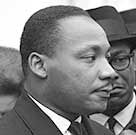|
|
 |
|
The
views expressed
on this page are soley those of the author and do not
necessarily
represent the views of County News Online
|
 |
The Daily Signal
Martin Luther
King on the Limits of Civil Disobedience
Peter C. Myers
January 14, 2018
More than most years, 2018 will be a year filled with remembrances of
Martin Luther King Jr. because in it falls the 50th anniversary of
King’s assassination.
It will also be a year filled with remembrances of 1968 itself as the
culminating year of the 1960s, a year in which the country seemed
divided even to the breaking point.
In many such remembrances, those two facts will be conjoined, and amid
our present climate of political division and radicalized opposition,
there will be much admiring discussion of King and the radicalism of
that era, along with much lamentation that King’s late-1960s vision of
an America thoroughly revolutionized in its core values passed, at
least for a time, from the scene with him.
Unfortunately, absent from this discussion will be any significant
appreciation of King’s moderation—a virtue that he himself, in the more
sober expressions of his thinking, regarded as indispensable to his and
his movement’s success.
Americans need an alternative to the mainstream media. But this can't
be done alone. Find out more >>
In fact, the single best representation of King’s mind during the most
successful portion of his career, the famous “Letter from Birmingham
Jail,” is in large measure a reflection on the virtue of moderation and
a justification of King’s claim to it.
King felt compelled to justify his claim to moderation, because it was
on precisely this ground that eight of his fellow clergymen had
challenged him, in a public letter to King that appeared in
Birmingham’s major newspaper.
These eight clergymen, all white, made their own claim to moderation.
It was plausible enough, as they were all opponents of racial
segregation and had written a public letter a few months earlier in
which they called for Alabama Gov. George Wallace to abide by the
Supreme Court’s anti-segregation rulings.
In their letter to King, they expressed a concern over his methods of
street demonstration and civil disobedience, which they characterized
as “extreme measures” likely to incite violence and sharpen divisions.
King began his response by noting that he seldom replied to critical
letters due to the huge volume that he received. The letter from these
eight clergymen was a special case, he wrote, because its authors were
“men of good will”—men of faith, anti-segregationists, and moderates
whose challenge to his own moderation he took very seriously.
In his response, King did not altogether reject the imputation of
extremism.“Was not Jesus an extremist for love?” he asked, and were not
the prophet Amos, and our own Presidents Thomas Jefferson and Abraham
Lincoln, extremists for justice?
Nonetheless, he indicated that the charge stung him, and he defended
his own extremism by explaining how it was consistent with and governed
by the virtue of moderation, rightly understood.
In his book, “Stride Toward Freedom” (1958), King recalled how he had
framed his task, as he prepared his initial speech to participants in
the Montgomery bus boycott. “How could I make a speech that would be
militant enough to keep my people aroused to positive action and yet
moderate enough to keep this fervor within controllable and Christian
bounds?”
Moderation can in some circumstances require militancy, but militancy
can and must be moderate. The same idea informed King’s argument in the
“Letter from Birmingham Jail.”
Within the eight clergymen’s frame of reference, the moderate position
was to support gradual desegregation—in contrast to both Wallace’s
extreme “segregation forever” position and the protesters’ demand for
immediate desegregation.
Within King’s frame of reference, however, the moderate position was to
conduct nonviolent, direct-action protests against segregation. This
approach contrasted with what King called the “two opposing forces in
the Negro community”: the extremes of demoralized complacency and of
the “bitterness and hatred” propagated by those advocating violence and
separatism.
King believed his own frame of reference was the proper one, because he
held the gradual approach, judged in historical context, was in fact
not a moderate position: “We have waited for more than 340 years for
our constitutional and God-given rights.”
King’s commitment to moderation in the “letter” is actually broader and
deeper than this rejection of gradualism. Two general points are of
primary importance.
First, King’s militancy was moderate in that it incorporated a respect
for tradition. He justified his activism by appealing to principles
grounded in venerable Western and American traditions of natural law
and natural rights philosophy.
Second, he defended his direct-action methods—including the practice of
civil disobedience—as consistent with and even, in the proper
circumstances, required by the rule of law. In King’s explanation, an
appeal to higher-law principles of justice must not reflect a disdain
for man-made law, but to the contrary, must preserve and exemplify “the
highest respect for law.”
The “right to protest for right,” King maintained, is both a natural
human right and a precious American inheritance. The spirit of
righteous resistance is among the virtues of the American
character—yet, like other such qualities, it loses its virtuous
character when it is carried into extremism.
Those in our own day who feel themselves moved by this spirit would do
well to learn this lesson from King’s “letter”: Resistance loses its
righteousness when it ceases to be governed by the virtues of
moderation and prudence.
Read this and other articles at The Daily Signal
Read "Letter from a Birmingham Jail" in its entirety here
|
|
|
|

